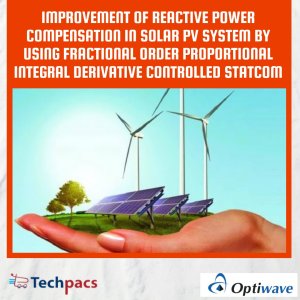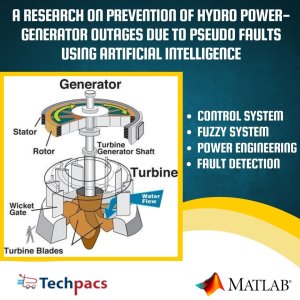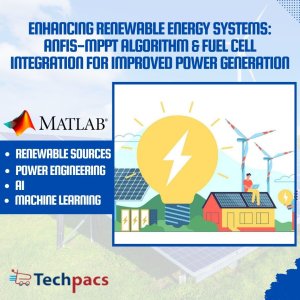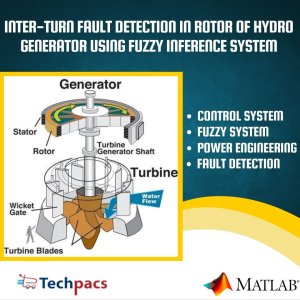An Innovative Hybrid Neuro-Fuzzy and FOPID Model for Efficient EV Charging Using Solar PV Panels
Problem Definition
The literature review reveals that existing methods for tracking the maximum power point of solar panels have shown effectiveness in some cases, but they are plagued with several limitations and problems. One major issue highlighted is the significant fluctuations in voltage, current, and power outputs even during MPPT and de-rating operations, leading to unstable current levels that could potentially harm the batteries of electric vehicles. Moreover, traditional models suffer from slow rise time, settling time, and response time, all of which contribute to their overall performance degradation. These findings underscore the urgent need for a new model that can enhance efficiency by reducing current fluctuations and addressing the shortcomings of current tracking systems. By addressing these key pain points, the development of a more robust and reliable model could significantly improve the overall performance of solar panels in various applications.
Objective
The objective of this research is to develop a hybrid model that combines ANFIS and FOPID controller for maximum power point tracking (MPPT) algorithms in charging electric vehicle batteries using PV systems. This model aims to reduce current fluctuations and improve efficiency during MPPT and de-rating operations, ultimately enhancing the overall performance of solar panels in various applications. By utilizing two membership variables as inputs and processing them through a Sugeno-type ANFIS, along with the use of FOPID controller to improve system response time, the proposed model seeks to provide a stable and effective solution for charging EV batteries with solar energy.
Proposed Work
In order to address the research gap identified in the literature survey, a hybrid model combining ANFIS and FOPID controller for MPPT algorithms in charging electric vehicle batteries using PV systems is proposed. The main focus of this work is to reduce the oscillations in current values generated by traditional models, enabling efficient and safe charging of EV batteries. The proposed model conducts MPPT and De-rating operations to optimize current values for battery charging, ensuring stable and effective power generation from solar PV panels. By utilizing two membership variables as inputs and processing them through a Sugeno-type ANFIS, the model generates a single output of reference voltage. Additionally, the FOPID controller is employed to enhance the rising time, settling time, and response time of the system, ultimately improving the efficiency and performance of the charging process.
This approach was chosen based on the need identified in the problem definition for a model that can effectively track the maximum power point of solar panels without the fluctuations that harm battery performance. By integrating the intelligent hybrid of ANFIS and FOPID controller, the proposed system aims to overcome the limitations of traditional models and provide an efficient solution for charging EV batteries. The rationale behind selecting these specific techniques lies in their ability to reduce fluctuations in current values, improve stability during power generation, and enhance the response time of the model. By combining the strengths of ANFIS and FOPID controller, the proposed work seeks to optimize the charging process for electric vehicles, ensuring safe and efficient utilization of solar energy for battery charging operations.
Application Area for Industry
This project can be implemented across various industrial sectors such as renewable energy, electric vehicles, and smart grid systems. The proposed solutions address challenges faced by these industries, such as fluctuations in current values, slow response times, and inefficient battery charging. By utilizing a hybrid model based on Adaptive Neuro Fuzzy Inference System (ANFIS) and Fractional Order proportional Integral derivative (FOPID), the project ensures stable current output for effective battery charging. The model is designed to perform MPPT and De-rating operations to optimize the current output based on varying solar irradiance levels. By reducing oscillations in current values and enhancing the rising, settling, and response times, the proposed system not only improves the efficiency of the solar panels but also ensures efficient and simultaneous charging of multiple electric vehicles in a smart grid environment.
Application Area for Academics
The proposed project can enrich academic research, education, and training by providing a novel solution to the problem of tracking the maximum power point of solar panels with reduced oscillations in current values. This innovation can be applied in the field of renewable energy research, particularly in the development of efficient MPPT systems for solar panels.
Researchers in the field can utilize the code and literature of this project to improve their own work and explore new avenues for innovation. MTech students and PHD scholars can benefit from studying the proposed hybrid model of ANFIS and FOPID for their research projects, simulations, and data analysis in the domain of solar energy systems.
The application of this technology can lead to more stable and efficient solar power generation, which is crucial for sustainable energy solutions, especially for electric vehicles.
The future scope of this project includes further optimization of the hybrid model, exploring new control strategies, and testing the system in real-world applications to validate its performance and efficiency.
Algorithms Used
ANFIS is used in the proposed model to process inputs related to power & voltage error and power & voltage change in error, ultimately generating a single output of reference voltage. This helps in effectively monitoring the MPP in solar PV panels and optimizing battery charging for EVs. FOPID controller is employed to enhance the response time, settling time, and rising time of the proposed model. It generates controller signals such as kp, Ki, and Kd to improve the system's efficiency in managing the current produced by solar panels and charging multiple EV batteries simultaneously. The use of FOPID controller helps in reducing current oscillations and ensuring that the batteries are charged at their optimal levels.
Keywords
Maximum Power Point Tracking, MPPT Algorithm, ANFIS Controller, FOPID Controller, Hybrid Algorithm, Photovoltaic System, Electric Vehicle, Battery Charging, Current Control, Over Current Protection, Renewable Energy, Energy Management, Power Electronics, Electric Vehicle Charging, Renewable Energy Integration, Energy Efficiency, Control Systems, Energy Storage, Solar Panels, Oscillation Reduction, Battery Efficiency, Charging Optimization.
SEO Tags
Maximum Power Point Tracking, MPPT Algorithm, ANFIS Controller, FOPID Controller, Hybrid Algorithm, Photovoltaic System, Electric Vehicle, Battery Charging, Current Control, Over Current Protection, Renewable Energy, Energy Management, Power Electronics, Electric Vehicle Charging, Renewable Energy Integration, Energy Efficiency, Control Systems, Energy Storage, Solar Panels, Solar PV Panels, Hybrid Model, Adaptive Neuro Fuzzy Inference System, Fractional Order Proportional Integral Derivative, Oscillation Reduction, Charging Efficiency, Intelligent Model, Voltage Reference, Rise Time Improvement, Settling Time Enhancement, Response Time Optimization, Multiple EV Charging, Sugeno Type ANFIS, FOPID Controller Signals, Energy Optimization
| Shipping Cost |
|
No reviews found!

















































No comments found for this product. Be the first to comment!